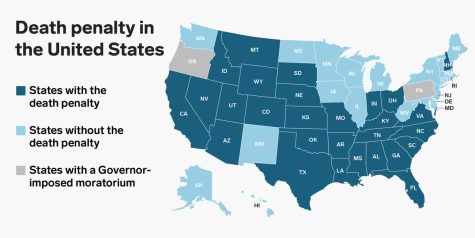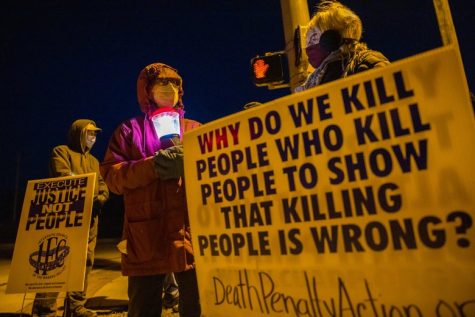The Duality of Race and Capital Punishment in the U.S.
April 26, 2022
Race plays a crucial role in deciding who receives the death sentence based on more serious crimes. When considering the death penalty, one’s thoughts may automatically go toward infamous criminals such as Ted Bundy and John Wayne Gacy — well-known serial killers who committed horrific crimes. Yet, there are death row inmates who do not amount to the previous men stated and face unfairness under federal and state law. Recognizing that these are criminals, the victims of their crimes are to be respected. Although victims influence a criminal’s punishment, it is the court that demonstrates racial injustice because they deliver the sentence.
 The only way to receive capital punishment is through a murder charge and the term is arguably too broad for a person’s circumstance. In fact, some states encompass nearly all murders under capital punishment and all persons involved where a murder had taken place. Even if they did not partake in the actual killing, the offenders can still receive the death penalty. The issue here is that circumstances are ignored and the death penalty should be reserved for a small subset of murders.
The only way to receive capital punishment is through a murder charge and the term is arguably too broad for a person’s circumstance. In fact, some states encompass nearly all murders under capital punishment and all persons involved where a murder had taken place. Even if they did not partake in the actual killing, the offenders can still receive the death penalty. The issue here is that circumstances are ignored and the death penalty should be reserved for a small subset of murders.
In the past, the death penalty was a punishment for more than just homicide crimes. The Death Penalty Information Center provides statistics of past cases, specifically focusing on race.
Earlier in the twentieth century, the penalty was open to the crime of rape, where 89% of the defendants were black and the victim was a white woman. White victim cases prove that race is an influential variable due to defendants being more likely to be sentenced to death if the victim is white. Although African Americans and white people are equally likely to be the victim of a homicide, 75% of the cases (resulting in capital punishment) involve white victims.
Historically speaking, African Americans hold a majority over whites and other minorities when it comes to receiving the death penalty. The American Civil Liberties Union states that “35% of those executed since 1976 have been black, even though blacks constitute only 12% of the population”. Because of racial discrimination, African Americans are four times more likely to face the harshest punishment within the justice system.
Another issue when it comes to race in the court system includes ineffective counseling. Poor representation of minorities from defense lawyers leads to unfair punishment. For the serious crimes that fall under capital punishment, the lower class who cannot afford an expensive lawyer for an extreme crime must resort to legal assistance from the federal government. Yet, funding for legal assistance was cut in 1996, specifically for cases involving capital punishment. This leads to an unfair trial which disagrees with the Constitution’s promise to uphold fairness within the court and take away cruel and unusual punishment.
minorities from defense lawyers leads to unfair punishment. For the serious crimes that fall under capital punishment, the lower class who cannot afford an expensive lawyer for an extreme crime must resort to legal assistance from the federal government. Yet, funding for legal assistance was cut in 1996, specifically for cases involving capital punishment. This leads to an unfair trial which disagrees with the Constitution’s promise to uphold fairness within the court and take away cruel and unusual punishment.
Jury selection has played a big role in exposing the corruptness of the court when it comes to minorities being charged more harshly. Most juries remain mostly white instead of presenting an accurate depiction of diversity in America. In fact, one issue that comes up during the selection of the jury includes the question of whether the juror has had a negative experience with the police.
Realistically, minorities (especially African Americans) are mistreated by the police based on prejudiced stereotypes. So if the juror were to answer the question honestly, they would be dismissed from the selection process. This decreases the chances of having a more diverse jury if the questions are unfairly geared towards a well-known occurrence. In addition, all-white juries for minority defendants are not fair because there is no balance of representation and racist opinions can come into play when juries make a decision.
Capital punishment should only apply to an extremely small group of criminals and the term “murder” is too loose (resulting in a denial of circumstance). Death penalty cases are extreme punishments that should consider the racial discrimination embedded into the justice system before sentencing a human to death. Although a person can only be given the penalty under a murder charge, specific elements should be highlighted by the government that shows what does and what does not apply to the term.
When it comes to race, minorities are more likely to receive the death penalty due to racial prejudice, unfair jury selection, ineffective counsel, and surprisingly, the race of the victim. In addition, people who were not directly involved in the killing should not have to face capital punishment. That sentence should be reserved for the villainous people that commit unspeakable acts, showing that they cannot change or benefit from prison.



